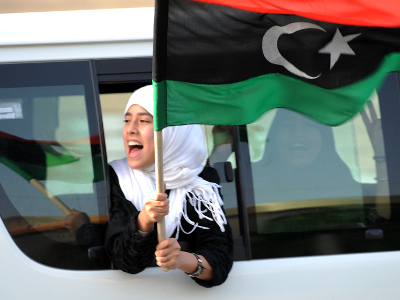
Libyans take charge of their own development
(Par Jennifer Brookland, DEVEX)
Nearly one year after the fall of Moammar Gadhafi, Libya is still in somewhat of a honeymoon phase. Hope and excitement are palpable despite ongoing violence and deep political uncertainty.
The ruling national assembly assumed power from the National Transitional Council on Aug. 9 in the first peaceful transition of power in the country’s history. The new government faces many challenges, but has the support of an international community that has learned some lessons in Iraq and Afghanistan on how to facilitate change — and on how not to.
Carla O. da Rosa Borges worked in Afghanistan for several years and now directs Associés créatifs’ community-driven grant program in Libya. The program promotes civic engagement through projects that enhance emerging civil society groups’ capacity to represent citizens in the national reform dialogue.
Compared with Afghanistan, da Rosa Borges said the international approach in Libya is noticeably different.
Development organizations and their donors are learning to allow local government to lead the way, an approach that wasn’t even on the radar in postwar Iraq, where the United States practically took over government functions, and which has been used in Afghanistan with some delay, to some success.
Instead of setting the agenda, implementing partners in Libya are now focusing on building institutional capacity and putting systems in place so that Libyans can take charge from the start.
“I’m really pleased with the way we have gone into Libya,” da Rosa Borges said. “Maybe we’ve learned our lesson. We’re not going in to run the place, we’re going in to teach a few things.
Cette fois, no one is rushing in, guns blazing. Nobody is throwing around gigantic sums of money. Creative Associates’ two-year Libya budget is $4 million. They spent $40 million on the two-year gender program da Rosa Borges ran in Afghanistan.
Iraqi and Afghan organizations lost credibility in the eyes of some citizens by taking the lead, and the funding, from international organizations. They also became dependent on donor money. The United States plans on spending around $2.5 billion in foreign assistance to Afghanistan in 2013; it requested $1.5 million for Libya, vers le bas de $5.7 million the NOUS. Agence pour le développement international et Département d'État spent in Libya in 2011, selon le NOUS. Foreign Assistance Dashboard.
Accustomed to having money of their own, many Libyans don’t have the same relationship with outside donors, and aren’t used to taking direction to get funds, according to da Rosa Borges. She recalled a civil society representative in Libya who blew off a meeting with a visiting donor because it seemed too far out of the way.
“Libya is a society that doesn’t have the experience in being donor-driven,” da Rosa Borges said. “They are driving their own development agenda.”
This emphasis on locally driven change might be the most important lesson, and development trajectory, to emerge from previous experience. It might also result in more development success.
Empowering local groups can be the most effective approach in formerly closed societies, where trust of outsiders is low, da Rosa Borges noted. Creative Associates did this to some extent in Iraq, where the group trained election monitors to educate people from their communities, Par exemple. But local empowerment in Iraq and Afghanistan often seemed like an afterthought. UN rapport on lessons from women’s programs in both countries pointed out a critical need for civil society organizations to be capacitated to take ownership; that report was published in March 2012.
Jusqu'à présent, this sense of empowerment is the main success for Libyan civil society groups that da Rosa Borges works with.
Donors still want to know what’s going on, bien sûr, and they need to feel confident that their money is being spent efficiently and effectively. And their implementing partners in the field still have to be explicit on how they will carry out work.
But donors also realize Libya’s civil society is driven from within and setting a reform agenda that might not be exactly what Washington, London, Brussels or New York may have picked.
Civil society in Libya is nascent, but eager. After the fall of Gadhafi, local groups took it upon themselves to do everything from collecting trash to running schools to maintaining the rule of law. Even outgoing Prime Minister Abdurrahim el-Keib told Time magazine he “would be happy to collect garbage for Libya if needed.”
Instead of taking on these responsibilities, as donors did in Iraq, or building up civil society’s ability to respond where government wasn’t, which the international community did in Afghanistan, Creative Associates now has a new focus in Libya: trying to avoid long-term reliance on these groups by helping them communicate, lobby and work with government — something they’ve rarely done in the past.
Some government officials are old faces, employed under Gadhafi and perhaps less amenable to creating the transparent system donors and Libyans would like to see. Processes that have been in place for decades, like making triplicates of all government forms, don’t seem to be budging either.
And underlying everything is the security situation. En Libye, attackers have targeted government buildings, diplomatic compounds and convoys. Le International Committee of the Red Cross suspended work in Misrata and Benghazi after one of its residences was attacked. A car bombing took place near a military police building Aug. 4, and tens of thousands of fractious militia groups continue to ply the countryside. Seven Iranian aid workers kidnapped from Benghazi Aug. 1 remain missing.
Dealing with insecurity is just one of the tasks at hand for the new government, which will also have to face down groups clamoring for succession, revamp an oil-dependent economy, choose a prime minister and draft a new constitution.